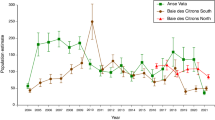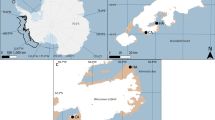Abstract
The Wadden Sea experiences a warming climate with water temperatures having increased by about 2 °C during the last 50 years. We studied possible effects of this temperature rise on the dynamics of a cockle (Cerastoderma edule) population in the westernmost part of the Wadden Sea by monitoring the numbers of aged cockles since the early 1970s. We found increased rates of mortality at extreme climatic conditions. In particular, survival declined to close-to-0 in all age classes in severe winters. In the hottest summers, survival was somewhat reduced in older (> 1 year old) cockles. On the other hand, recruitment was enhanced after cold winters, but this was not a direct effect of low temperatures as it was mainly caused by a reduction of the abundance of predators on small spat. The observed decline of the long-term trend in recruitment was compensated by an increasing trend of winter survival, resulting in an absence of any long-term trend in adult numbers.





Similar content being viewed by others
References
Ansell AD, Barnett PRO, Bodoy A, Massé H (1981) Upper temperature tolerances of some European molluscs. Mar Biol 65:177–183
Beukema JJ (1979) Biomass and species richness of the macrobenthic animals living on a tidal flat area in the Dutch Wadden Sea: effects of a severe winter. Neth J Sea Res 13:203–223
Beukema JJ (1985) Zoobenthos survival during severe winters on high and low tidal flats in the Dutch Wadden Sea. In: Gray JS, Christiansen ME (eds) Marine biology of polar regions and effects of stress on marine organisms. Wiley, Chichester, pp 351–361
Beukema JJ (1989) Bias in estimates of maximum life span, with an example of the edible cockle, Cerastoderma edule. Neth J Zool 39:79–85
Beukema JJ, Cadée GC (1997) Local differences on macrozoobenthic response to enhanced food supply caused by mild eutrophication in a Wadden Sea area: food is only locally a limiting factor. Limnol Oceanogr 42:1424–1435
Beukema JJ, Dekker R (2005) Decline of recruitment success in cockles and other bivalves in the Wadden Sea: possible role of climate change, predation on postlarvae and fisheries. Mar Ecol Prog Ser 287:149–167
Beukema JJ, Dekker R (2014) Variability in predator abundance links winter character and bivalve recruitment: correlative evidence from long-term data in a tidal flat. Mar Ecol Prog Ser 513:1–15
Beukema JJ, Dekker R (2015) Density dependence of growth and production in a Wadden Sea population of the cockle Cerastoderma edule. Mar Ecol Prog Ser 538:157–167
Beukema JJ, Dekker R (2018) Effects of cockle abundance and cockle fishery on bivalve recruitment. J Sea Res 140:81–86
Beukema JJ, Dekker R (2019) Is food supply for shellfish-eating birds in the western Wadden Sea affected by the between-species synchrony in year-to-year fluctuations of bivalve population parameters? Helgol Mar Res 73:8
Beukema JJ, Dekker R, Jansen JM (2009) Some like it cold: populations of the tellinid bivalve Macoma balthica (L.) suffer in various ways from a warming climate. Mar Ecol Prog Ser 384:135–145
Compton TJ, Rijkenberg MJA, Drent J, Piersma T (2007) Thermal tolerance ranges and climate variability: a comparison between bivalves from differing climates. J Exp Mar Biol Ecol 352:200–211
Crespo D et al (2017) New climatic targets against global warming: will the maximum 2 °C temperature rise affect estuarine benthic communities? Sci Rep 7:3918
De Wilde PAWJ, Berghuis EM (1979) Cyclic temperature fluctuations in a tidal mud-flat. In: Naylor E, Hartnoll RG (eds) Cyclic phenomena in marine plants and animals. Pergamon Press, Oxford, pp 435–441
Dekker R, Beukema JJ (2014) Phenology of abundance of bivalve spat and of their epibenthic predators: limited evidence for mismatches after cold winters. Mar Ecol Prog Ser 513:17–27
Dörjes J, Michaelis H, Rhode B (1986) Long-term studies of macrozoobenthos in intertidal and shallow subtidal habitats near the island of Norderney (East Frisian coast, Germany). Hydrobiol 142:217–232
Hancock DA, Urquhart AE (1964) Mortalities of edible cockles (Cardium edule L.) during the severe winter of 1962–63. J Mar Biol Ass UK 33:176–178
Harley CDG, Hughes AR, Hultgren KM, Miner BG, Sorte CJB, Thomber CS, Rodriguez LF, Tomanek L, Williams SL (2006) The impacts of climate change in coastal marine systems. Ecol Lett 9:228–241
Kristensen I (1957) Differences in density and growth in a cockle population in the Dutch Wadden Sea. Arch Neerl Zool 12:351–453
Malham SK, Hutchinson TH, Longshaw M (2012) A review of the biology of European cockles (Cerastoderma spp.). J Mar Biol Ass UK 92:1563–1577
Pandori LLM, Sorte CJB (2019) The weakest link: sensitivity to climate extremes across life stages of marine invertebrates. Oikos 128:621–629
Pansch C et al (2018) Heat waves and their significance for a temperate benthic community: a near-natural experimental approach. Glob Change Biol 2018(24):4357–4367
Philippart CJM, Anadon R, Danovaro R, Dippner JW, Drinkwater KF, Hawkins SJ, Oguz T, O’Sullivan G, Reid PC (2011) Impacts of climate change on European marine ecosystems: observations, expectations and indicators. J Exp Mar Biol Ecol 400:52–69
Smidt ELB (1944) Das Wattenmeer bei Skallingen. The effects of ice winters on marine littoral faunas. Folia Geogr Danica II 3:1–36
Strasser M et al (2003) How predictable is high bivalve recruitment in the Wadden Sea after a severe winter? J Sea Res 49:47–57
Strasser M, Reinwald T, Reise K (2001) Differential effects of the severe winter of 1995/96 on the intertidal bivalves Mytilus edulis, Cerastoderma edule and Mya arenaria in the northern Wadden Sea. Helgol Mar Res 55:190–197
Troost K, Van Asch M (2018) Herziene schatting van het kokkelbestand in de Waddenzee en Oosterschelde in het najaar van 2018. In: CVO Report 18.014, Wageningen University and Research, Wageningen, p 23
Van Aken HM (2008) Variability of the water temperature in the western Wadden Sea on tidal to centennial scales. J Sea Res 60:227–234
Verdelhos T, Marques JC, Anastacio P (2015) Behavioral and mortality responses of the bivalves Scrobicularia plana and Cerastoderma edule to temperature, as an indicator of climate change’s potential impacts. Ecol Indic 58:95–103
Funding
There was no funding for this study.
Author information
Authors and Affiliations
Corresponding author
Ethics declarations
Conflict of interest
The two authors declare that they have no conflicts of interest.
Human and animal rights statement
This article does not contain any studies with animals performed by any of the authors.
Additional information
Responsible Editor: G. Chapman.
Publisher's Note
Springer Nature remains neutral with regard to jurisdictional claims in published maps and institutional affiliations.
Reviewed by undisclosed experts.
Rights and permissions
About this article
Cite this article
Beukema, J.J., Dekker, R. Winters not too cold, summers not too warm: long-term effects of climate change on the dynamics of a dominant species in the Wadden Sea: the cockle Cerastoderma edule L.. Mar Biol 167, 44 (2020). https://doi.org/10.1007/s00227-020-3659-1
Received:
Accepted:
Published:
DOI: https://doi.org/10.1007/s00227-020-3659-1




